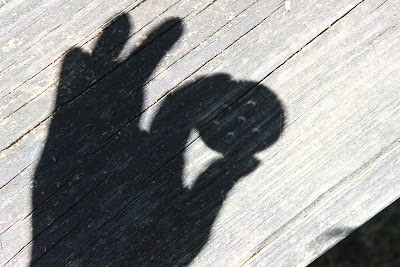One coincidental
benefit of moving to the northern Atlanta area last year was the
relatively short distance needed to travel to the totality zone of
the so-called Great American Eclipse of 2017. Some people planned
their trip years in advance. I got in my car at 11 AM and drove 60
miles northeast to Helen, Georgia, known for its German Alpine design
and atmosphere.
I had intended to
leave a little earlier in the day. But life happens. Specifically,
some wild animal was trapped in between our first floor and our
basement ceiling and our cats were flipping out, so naturally I
needed to investigate. Finally, I decided to let the cats sort it out
and hit the road.
I had also intended
to arrive in Helen in time for the start of the eclipse at around
1:00. However, I got hungry. We stopped for lunch just short of
Helen. I allowed myself a, “That’s so cool!” moment when I
peered at the Sun through my solar glasses in the parking lot before
getting back in my car.
 |
| My daughter's cracker snack became a solar eclipse projector. |
I had no specific
destination in mind. Because the Sun was so high in the sky, any spot
gave as good of a view as any other. But my 20-month-old daughter had
taken a nap in the car and I wanted to give her space to run around.
Thankfully, the town of Helen was crowded but not the park. I found a
bench on the grass to set up my camera and take my initial telephoto
shots. A fellow sky-watcher with a similar aged child commented how
independent my Josephine is, entertaining herself with rocks. It’s
a good thing, too, because I didn’t want to take my eyes off the
sky for long.
Eventually Josephine
noticed the narrow, shallow stream. For the next hour, nothing
distracted her from the sheer joy of picking up river rocks and
throwing them in the water. I relocated to the stream bank where I
sat with my equipment, in disbelief of what I was seeing.
No photo I’ve
taken or seen captured what I saw yesterday. It goes beyond imagery. The
darkness, the senses, the emotions, all too complex to be summed up
in a picture. I’ve never had an experience like that before. The
total solar eclipse was one of the most beautiful things I’ve ever
witnessed.
 |
| Solar eclipse in the lens flare. |
In the minutes
before totality, it dawned (or dusked) on me that the darkness was
descending as if it were sunset. So much about the atmosphere, except
the position of the Sun in the sky, felt like dusk. I even had the
instinctual maternal thought of, “My 20-month-old is too young to
play in a stream in the dark!”
As for my eclipse
watching partner, the Sun didn’t hold her interest at all, and she
kept throwing rocks into the water as if nothing else in the world
was more important. I even tried to guide her head upward during
totality, but she fought me and won, returning to her water play.
As the tiniest
slivers of light shined, dimmed, and disappeared, cheers erupted all
around me. I didn’t expect this. I was not in a crowded place. But
in the distance in every direction, shouts and claps echoed. Complete
strangers, completely different people, all united as one to admire
the beauty of our Solar System and our place in it. I couldn’t help
but cheer as well.
I have degrees in
astrophysics. I am a space professional. In the minutes of solar
eclipse totality, all intellectual thoughts left me. No word left my
lips other than “Wow” and “Oh my God.” I don’t know when I
started crying, but water filled my eyes and spilled down my cheeks.
I didn’t expect to cry. And I didn’t let tears stop me from
continuing to stare in awe as our closest planetary neighbor blocked out the light of our closest star.
 |
| I still can't believe I took this shot without a tripod. |
As the light
returned, I felt as though I had taken part in something much greater
than myself. In reality, I took no part in it at all. The motions of
the Earth, Sun, and Moon are all set in predictable clockwork, and we
humans just observe. But by gathering together for this single
purpose, we were a movement of another kind. I had a huge smile on my
face.
 |
| Post-totality smile! |
We stayed a little
while longer. I put the solar glasses on my face and leaned back on
the stream bank, not caring about capturing photos or missing
totality. Josephine kept playing with rocks and water as if nothing
else was happening. Eventually I dragged her away and set off for
home.
It took much longer
to get back than it did to get there. The park road was at such a
standstill, I put my car in park, opened my car door, and watched the
eclipse on and off for another half an hour more. Eclipse traffic
combined with commuter traffic to create a mess on the road to home.
But it was worth it. Seeing a total solar eclipse was worth every
minute I spent sitting in traffic while my daughter screamed.
I experienced the
eclipse many times over since then, processing my own photos and
browsing others’ postings. What strikes me is how much this astronomical alignment brought us all together: space enthusiasts and regular people, friends and strangers alike. People who otherwise wouldn't care about celestial objects were staring in wonder. The solar eclipse brought rare unity to our country, centered around the Sun and the Moon. Thank you all for sharing in the astro love!











